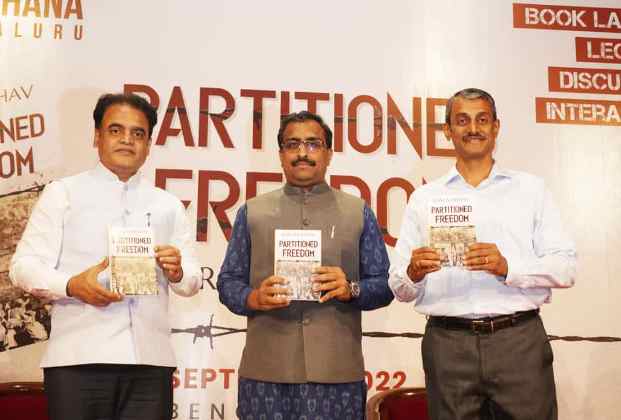“This book answers the questions when Bengal was partitioned in 1911 whole country stood behind Bengal, and the whole nation was engaged in agitation. But when the whole of India partitioned why did India become stagnant?” said author Shri Ram Madhav at the launch of his book “Partitioned freedom”. The book “Partitioned India” by thinker, writer and National executive committee member, RSS Shir Ram Madhav was launched on September 23, at Sathish Dhawan auditorium, IISc Bengaluru. A discussion was also held on the book. Honourable minister of higher education of Karnataka Dr Ashwathnarayan and thinker Kiran Kumar S were present.
Addressing the gathering Ram Madhav said, “When Bengal was partitioned in 1911, the Britishers thought that few Bengalis will be unhappy. But the whole country stood up. Vande Mataram was a mantra for the whole agitation. The trio of Lala Lajpat Roy, Bal Gangadhar Tilak, and Bipin Chandra Pal led the movement from the front. The British bowed down, and King George himself came to take back the decision and undo the partition. Indians won in that battle and the nation reminded united.”
In 1940 Jinnah declared Pakistan and India partitioned in 1947, but India didn’t stand up. This book answers what happened between 1940-47 and what changed between 1911-1940. What happened during that particular period? And also when the whole of India partitioned why did India become stagnant?”
“A country should be vigilant by itself and not depend on anyone in particular for the unity of the country” – Shri Ram Madhav
“This book is of Gandhiji and Jinnah. Both are from Gujarat, barristers and Jinnah used to boast I will be the Muslim Gokhale. He was instrumental to bring the Muslim League and Congress to the Lucknow Conference. But he left Congress in 1920, citing Gandhi’s intervention in the Khilafat movement. He stayed low-key and came back to the limelight in 1935. Jinnah then became a champion of Muslim politics in India. This is a story of that leader.”
“On the other hand, Mr Gandhi came to India in 1915. He had experienced Africa. He had a notion that Hindu-Muslim unity was first and freedom came next. In 1919, he became the president of the Khilafat movement. In return, he expected help from the Muslim community for the Congress in the freedom movement. He gave concessions after concessions for Muslims be it Vande Mataram, national flag, bhajan, language, everything. From 1920 to 1935 separate electorate for the Muslims was accepted by Congress. This phase of appeasement did not make Muslims come close to congress and instead resulted in the partition.”
“During the last decade of the struggle, Gandhi tried to ensure that India stayed united but it was too late as we had already nurtured the demon. This is a tragic story of two leaders. Finally, this story of partition gives us two important messages. Firstly, never indulge in appeasement of the forces who are about to destroy the integrity of the country, and secondly ponder on why we succeeded in 1911, and not in 1947. The answer is the country should be vigilant by itself and not depend on anyone in particular for the unity of the country.” (VSK Karnataka)

















Comments